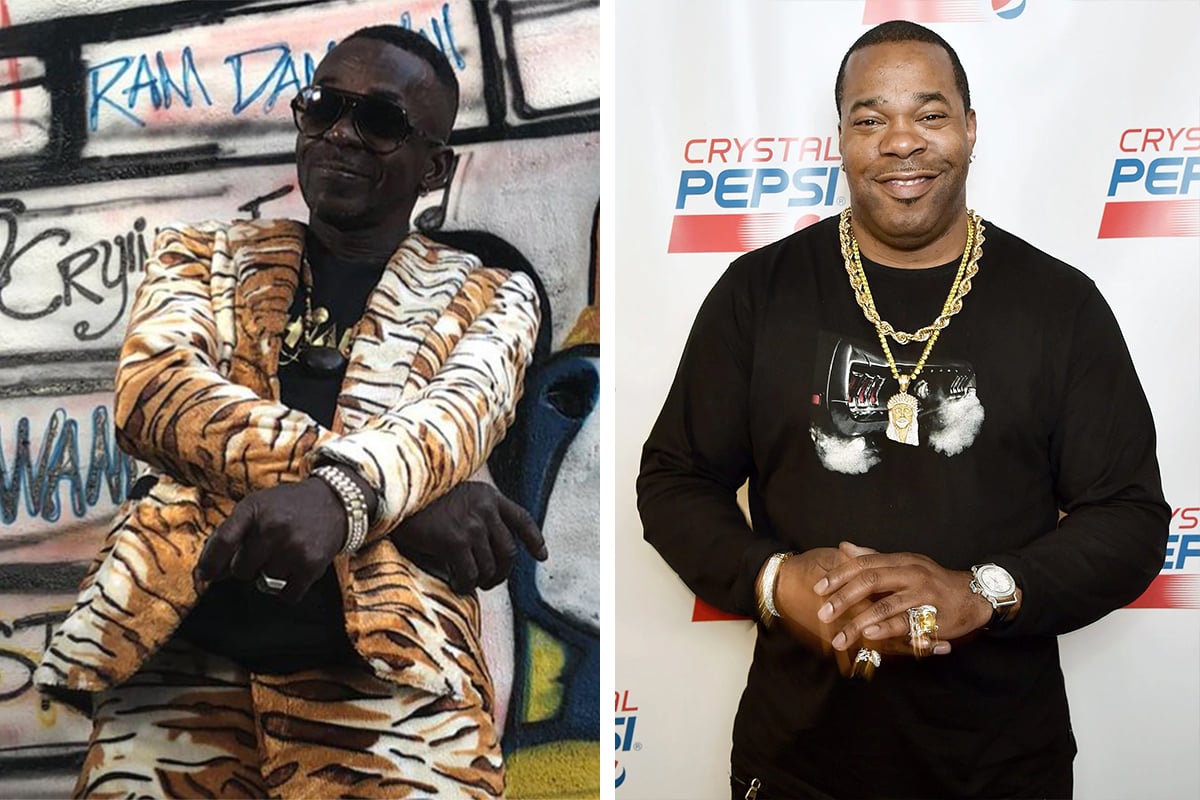Tiger Laments Dishonor From Dancehall Deejays, Hails Busta Rhymes For Recent Tribute

Veteran Dancehall deejay Tiger has thanked Busta Rhymes profusely for taking time out to laud the genre’s greats such as himself, whom the rapper said he emulated when he embarked on his musical career decades ago.
On Wednesday, Tiger reposted a video clip of Busta Rhymes paying homage to several Dancehall legends during Swizz Beatz recent birthday party. He also transcribed verbatim, some of Rhymes comments.
“I use to sit home and I use to watch the f-cking video tapes, I use to be yow I wanna be like them!!! @iampapasan @ninjaman_music @professornuts @supercat_dondada @admiralbaliey @officialrankingtiger 👑 dem man deh mi did a try be, everything wey me do me learn from dem man deh, so when I joke around on stage, I learned from them, the way I f-ck n-ggas up on their records, I learned it from them!!!” Busta Rhymes had said as he switched to Jamaican patois.
In turn, Tiger, now 61 years old, said Busta’s statements were like music to his ears, as tributes of that magnitude, or acknowledgment of his impact on the styles and delivery of many a deejay, have never been done before.
“@bustarhymes Thank you for acknowledging my work in this business (grateful), nuff love and respect every time King, you deserve a @recordingacademy for this speech my brother. Dem say big man don’t cry yet it takes a real one to admit when something brings tears to dem eyes,” Tiger wrote.
The Dancehall legend then went on to say that gratitude from his own Dancehall compatriots who drew inspiration from or emulated his music, was lacking. The When artist also admonished Jamaican artists to pay tribute to the pioneering artists on whose shoulders they are standing.
“As a Veteran in this entertainment world 🌎 I don’t get no love from my fellow entertainers much less recognition, so maximum big ups to the few who mention my name in their mouth as part of their influence on their musical journey and this is my truth, yet still them do the same thing and more watch, learn, observe, copy and use my style and never say a word about it… and here is a giant in the HipHop industry to finally give real homage to those who have influenced him in Reggae and Dancehall,” Tiger wrote.
“I feel blessed and these are the things that keeps me going, my family and my true fans I love you,” he added.
Tiger whose given name is Norman Washington Jackson, nevertheless, singled out Bounty Killer for special praise.
“As Jamaican entertainers we really need to do a better job when it comes to the foundation of our music and to those who have worked so hard for it to be where it is now and still going seen. A special big up to @therealswizzz more life n blessings bredda, unlimited respect to @grunggaadzilla I never forget even if you did,” he stated.
“It’s nice to be important, but it’s more important to be nice!!!!” Tiger, a native of Liguanea in St Andrew added.
Tiger, who has been described as a Dancehall deejay with an infectious sense of humor was one of Jamaica’s biggest names in Dancehall until he met in a horrific accident in January 1993, which not only almost claimed his life, but impeded his speech and memory and ultimately stifled his career.
Back then, the No Wanga Gut deejay was struck from his motorcycle by a diplomat in St. Andrew, and sustained extensive bodily and head injuries including contusion of the left, right and frontal lobes of the brain. Tiger also suffered severe impairment of memory, concentration, and personality change, among other things.
According to media reports, he was initially pronounced dead by doctors, but was revivified and later placed on life support. When the Move Over artist recovered, medical professionals predicted that he would need neurotherapy, speech therapy and physiotherapy for the rest of his life.
However, over the decades, Tiger through sheer willpower, regained his motor functions and committing himself to speech therapy so he could recover his ability to speak clearly. Today, he only has a slight slur on his words.
His Dancehall career began at the University of the West Indies (UWI) Students’ Union in the late 1980s, where he performed his first hit song, Puppy Love . The diminutive deejay entertained his way to stardom, and was, three years later, crowned the ‘Prince of the Dancehall’.
Tiger went on to top the charts with Wanga Gut in 1986 as well as Come Back To Me in 1987 which featured singer Anthony Malvo, which was followed up with his legendary When.
His single Cool Me Down was also included on the soundtrack of the film Cool Runnings. Tiger also recorded on beats for numerous A-list producers in his heydays, including King Jammy, Gussie Clarke, Sly and Robbie, Philip “Fatis” Burrell and Donovan Germain.
In 1989, Tiger became one of the first Dancehall artists to cross over into the US Hip Hop scene when after he collaborated with the Fat Boys on the track titled T’ings Nah Go So .
He was signed by Columbia Records’ Chaos label in the early 1990s, where he voiced the Claws of the Cat album in 1993 which was produced by Sly Dunbar, Dave Kelly, Steely and Clevie, and others. It featured tracks such as Groovin, All Out for the Killing and Nobody Move which were produced by iconic producer Dave Kelly; Windscreen which was produced by Steelie, Beep Beep and Just Look.
Other major hits recorded by Tiger were Me Name Tiger in 1986, Bam Bam in 1988, Shockin’ Colour in 1989, Ram Dancehall in 1989, Love Affair and Touch Is a Move in 1990, Tiger a Tiger and Ready Fi Dem in 1991 as well as Deadly and Put It On in 1992.
